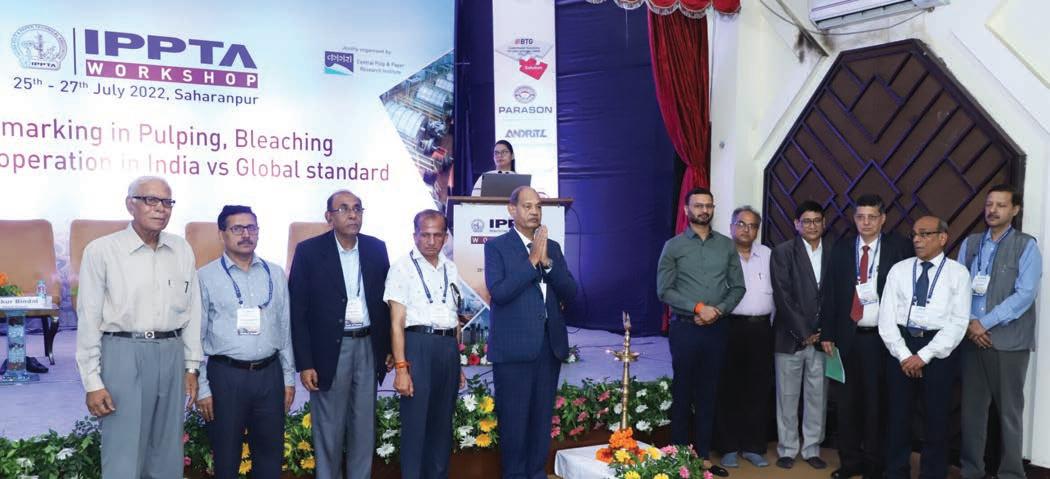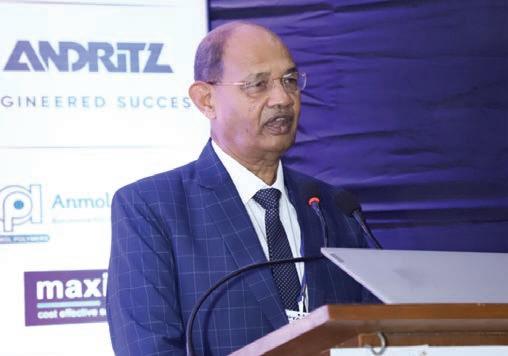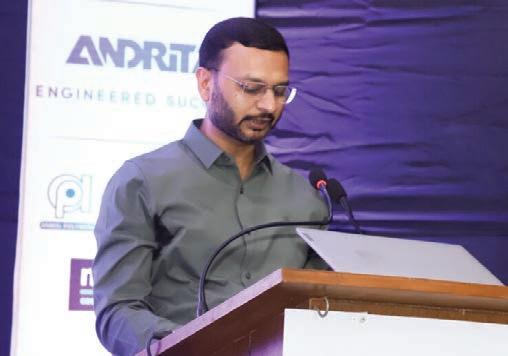
6 minute read
IPPTA, CPPRI Organise Workshop on Pulping, Bleaching & Recovery in Paper Mills
The workshop, held from July 25 – 27 at Sharanpur, saw many renowned faces from the paper industry.
ndian Pulp and Paper Technical Association (IPPTA) and ICentral Pulp & Paper Research Institute (CPPRI) jointly organised a workshop on 'Benchmarking in Pulping, Bleaching & Recovery Operation in India vs Global Standard' at CPPRI Campus, Saharanpur from July 25 to July 27, 2022. The workshop aimed at addressing the current challenges being faced by the paper industry. In the welcome address, Dr. M.K. Gupta, Chairman – Program Committee, Director, CPPRI set the tone for the proceedings and thanked the team of CPPRI and IPPTA. Mr. M.K. Goyal, Honorary Secretary General, IPPTA, presenting the outline of the workshop, said, “We came up with the topic on pulping, bleaching, and recovery technologies – which form the backbone of the pulp and paper industry. The operations of these three verticals of the paper industry are becoming very important. In the last two years with the global crisis, we have seen that the prices of waste papers are going up significantly. This is how we came up with the topic.” The keynote speech was presented by Dr. R.C. Rastogi, CMD, Khatema Fibres Ltd. “This year marks the completion of my 50th year in the paper industry. Today, waste paper-based paper mills take up 70 percent of the total paper mills in the country while wood-based paper mills are about 20 percent or so. Nowadays, chemical recovery has improved a lot compared to the conditions of about 25 years or so. CPPRI, as well as IPPTA, have immensely benefitted the situation of the paper industry,” he said, adding that the government should formulate policies after considering the problems of the paper industry so that the industry becomes competitive both – locally and internationally, and achieve further growth. While appreciating the efforts of the integrated pulp and paper mills towards social and farm forestry, he informed that the industry representatives/associations have been discussing with the government to formulate policies to make degraded lands available to the industry and encourage the farmers to contribute to developing such forests. He further added that if bagasse is made available profusely to the paper industry, around 100 percent of the problems related to raw material will be solved. “This would also reduce our import


Dr. R.C. Rastogi, CMD, Khatema Fibres Ltd.
dependence on waste papers. In this way, we would not only be saving foreign exchange but also providing good-quality paper and paper products,” he said. “Similarly, if one can improve in any of these three areas – pulping, bleaching, chemical recovery, it will be regarded as a great deal of contribution made by the seminar. The single-use plastic is banned by the Government of India as it was harmful to the environment. If we consider the global scenario, the concept of single-use plastic is very different in western nations as compared to our country. Also, it is important to note that PE-coating, which is done on paper and paperboard, is also banned. The e-commerce players like Amazon, Myntra, or Flipkart – have also started replacing their plastic packaging with paper-based packaging solutions,” he added. Presenting the presidential address, Mr. Ganesh Bhadti, President, IPPTA, and Director (Operations), Seshasayee Paper and Boards pointed out, “When the COVID-related challenges subdued, and we all thought that the industry is now performing well, the coal shortage crisis came up. With regard to solar energy or other forms of renewable energy, we have not developed that kind of capacity that can be substituted or fulfill the energy requirements in place of coal. All these integrated mills should know how to utilise the raw materials, and how to maximise the yield. This is why we chose this topic for the workshop – amid the ongoing shortage of coal and energy resources. While the challenges will always be there, we should brace ourselves for them. We are striving to provide solutions to the present challenges through the workshop and would continue to address the challenges in the future years too.” Mr. Ankur Bindal, Director, Bindal Paper Mills Ltd., who was the chief guest at the workshop, presented the inaugural address, “In today's scenario, many different raw materials like – softwood, hardwood, and agro residues are available in the paper industry. An appropriate selection of raw materials is required for better papermaking. To protect the cellulose content, pulping conditions should be standardised and optimised, and modern technologies with lesser use of hazardous chemicals in the cooking process should be adopted. The process of bleaching becomes a cause of deterioration of most cellulose fibers and leads to a decrease in the strength of the fiber, pulp, and paper. Ozone bleaching is a hot topic in the paper industry, which eliminates most of the bleaching chemicals either partially or fully. However, we cannot totally depend on ozone bleaching, because its uncontrolled action can damage the fiber quickly as compared to any other bleaching chemicals. Therefore, the enzymes are the best solutions with almost no harm to any fiber. We all know that recover y is needed to maintain sustainability in the papermaking process. We have to maintain high solids content in the black liquor so that we are able to maintain lesser steam and chemical consumption to increase sustainability. Most paper makers are well aware of how to produce high-quality papers at low operational costs. Although there are a number of issues about which our renowned scientists and researchers should put their minds together and find pertinent solutions. We should also work on being independent in terms of our raw material requirements including chemicals, and reduce our dependence on imports. Innovations are never-ending processes and we will have to find better solutions than earlier for maintaining a sustainable process,” he said. Other guests of honour in the session were Dr. RM Mathur, Ex-Director, CPPRI, Dr. Bipin P. Thapliyal, Ex-Director, CPPRI and Dr. Sujay Chattopadhayay Professor & Dean, IIT Roorkee, Saharanpur among others. The workshop saw many renowned faces from the paper industry. The inaugural session was followed by technical sessions on advancement in the pulping process, benchmarking of energy management & process and advancement in the chemical recovery process. The sessions on the next day witnessed discussion on case study on bleaching process, benchmarking kraft mill & raw material, non-process element impact & remedy, process variability & improvement – pulping, chemical recovery, and recovery boiler. The threeday workshop concluded with the presentation of mementos and a vote of thanks by Mr. M.K. Goyal. ¢










